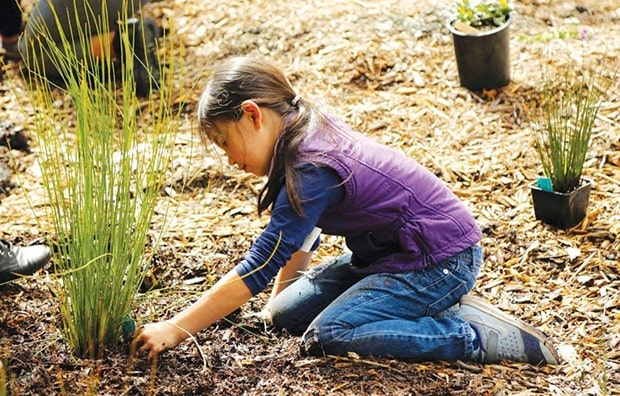Daily Acts takes on climate emergency
BY KARY HESS
When Oxford Dictionaries names “climate emergency” its 2019 Word of the Year, it’s time to take action.
And that’s what Daily Acts is doing. Begun in 2001 with an Eco-Zine called Ripples and a handful of sustainability tours, it’s now a community-resilience organization with 13 staff, educating 60,000 people through 1,300 programs.
“Educating and empowering people is the basis of our work to spread solutions and models creating gardens, doing graywater, harvesting rainwater, installing gardens, growing healthy food,” says founder Trathen Heckman. “The next level is fostering coalitions and networks to build community leadership. And the third piece is the public and political will.”
In 2019 Daily Acts educated 5,637 people and leaders at 109 events. It offers programs teaching gardening, food preserving and eco-landscape installation to veterans, fire victims and more.
“It can’t just be ‘recover from this disaster and prepare for the next one’—we need to stop the problem,” Heckman explains. “If you increase soil organic matter even 1 percent it has massive effects—it holds more water in the soil so it addresses our drought problem, you grow food, it sequesters carbon.”
The urgency of the climate crisis instigated Daily Acts to co-found Climate Action Petaluma. Last April, CAP led the City of Petaluma to declare both a Climate Emergency and a new Climate Action and Policy Commission. Five more Sonoma County cities followed suit. Since the new Climate Commission’s inception, Sonoma County has committed to creating a 10-year climate emergency mobilization framework.
“We need practical solutions and models people can apply; building community leadership, building public and political will,” Heckman says. “We need to talk about the painful, harsh reality of the climate emergency while engendering a sense of hope and positivity … We have to be true about where we’re at; only a truth-based strategy can actually help us affect the transformative scale of change that is needed.”
According to Heckman, 30–50 percent of emissions are consumption-based. Changing light bulbs, replacing lawns with food-based landscaping and eating less meat all make a difference.
“One of the most common patterns in nature is the network,” Heckman says. “What if we’re all doing victory gardens and we’re building soil and growing food and we’re connecting with our neighbors and our hands are in the soil so we’re addressing the mental health crisis of eco-anxiety?”
While gardens make a difference, public policy is also integral.
“Our daily actions alone won’t do it; we have to show up, we can’t assume others are leading,” Heckman says. “We could be the first city in the country that creates a Climate Sequestration Plan. Petaluma and Sonoma County could continue to be leaders.”
The world needs everyone’s talents.
“A lot of people think they aren’t experts, but imagine if at every city council meeting there are new people showing up,” he says. “You wake up and then you get inspired. Then you start talking and sharing and connecting with people.”


